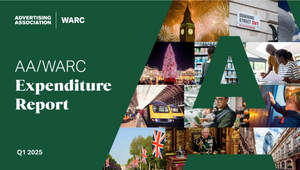
Economic and Talent Crises Lead Agenda at Advertising Association’s 2023 Summit

Gathering for the first time in person since before the covid-19 pandemic, you might think LEAD 2023 would be the most positive Advertising Association summit since 2020. But while some semblance of normality has returned to the UK advertising industry, the themes of the day pointed to the many varieties of anxiety and turmoil that the industry is up against in the year ahead.
As broadcaster and journalist Nina Hossain took to the stage of the Odeon in Leicester Square to lay out the shape of the conference, it was clear that 2023’s agenda holds existential challenges around economic hardship, a talent crisis, a lack of diversity and the climate emergency. And while the pandemic is largely behind us in the UK, the phrase “unprecedented times” still popped up throughout the morning.

The Political Context
With a general election within sight but not yet imminent, it seems fitting that the LEAD 2023 schedule included keynote addresses from both the Conservative government’s secretary of state for digital, culture, media and sport, and the Labour opposition’s shadow secretary for the same department.
Culture secretary Michelle Donelan spoke via video recording, in which she outlined the government’s vision and key priorities for the advertising sector. Reminding the conference of her background in marketing – before becoming an MP, Michelle worked in marketing for companies including WWE – she shared her affinity with the sector, applauding the most potent advertising work she’d recently seen. Michelle celebrated the work that adam&eveDDB has been doing for the anti-suicide charity CALM, work that she called “compelling an accessible” and even “advertising at its best.”
Noting the, perhaps, surprisingly strong figures when it comes to ad spend recently, she stressed that part of her department’s role is making sure creative and ad industries continue to thrive and drive growth, and outlined how she intends to do that. “You have a real ally in me,” she insisted.

Each year, the spectre of regulation emerges in these speeches, and speaking on government involvement in advertising, the secretary of state promised to make decisions based on common sense and evidence, noting that she had decided not to agree to the sale of Channel 4: “A really positive outcome for Channel 4 and the wider creative industries,” she noted.
The subject of the sector’s talent crisis was impossible for Michelle to ignore, and she also reflected on the challenge of helping people fill jobs in the creative industries, pointing to the government’s 'Creative Careers Programme' and creative apprenticeship schemes.
Finishing with a sentiment the people in the room would do well to hold her to, she finished: “As secretary of state, one of my duties is to protect the things that make our country great. And our world-renowned creative industries are right up there at the top of the list.”

With a Labour government within the next two years now a real possibility, the opposition keynote set out Labour’s agenda and aspirations for the creative industries. Lucy Powell, shadow secretary of state for digital, culture, media and sport opened with a joke about the disappointment of a venue usually used for glitzy premieres playing host two politicians. “At least one of them isn’t Nadine Dorries,” she quipped, getting the first hearty laugh of the day from the audience.
Lucy’s speech suggested that the Tory government of the past 13 years has shown less appreciation for the creative industries than they deserve. “Despite the creative industries being an economic powerhouse, they are often one of the ‘Cinderella sectors’ of our economy – undervalued without government focus,” she said.
Inevitably, the economic pressures of a difficult year have led to a tightening of belts for consumers. The shadow secretary criticised the government’s lack of a plan for growth as no help in that regard.
Matching the secretary of state’s effusive address, she noted that Labour “backs the creative industries to the hilt, just as we did when we were last in government.” In opposition, she reminded the audience that Labour had fought to defend Channel 4 from a Conservative threat, and that it would continue to fight to protect the license fee for BBC.
On talent, Lucy promised that Labour would reform apprenticeships and put emphasis on a creative curriculum, as well as focusing on digital skills.
While there has been an online “accumulation of power into fewer and fewer hands, with those holding the data and the platforms dominating digital markets,” she suggested there has also been little accountability for online media platforms, which can be seen in shocking figures around advertising budgets wasted on misinformation-spreading sites.
“Labour believes Britain's future prosperity lies with home-grown industries and the creative industries are a Great British success story,” concluded Lucy. “Alongside an ambitious plan for growth in our economy, Labour in government will offer stability and partnership - a national renewal as a creative nation. Think Cool Britannia 2.0, but without Oasis… because not even a Labour government can mend that relationship I'm afraid. I look forward to working with all of you to realise these ambitions.”
For a less partisan angle, TalkTV’s political editor, Kate McCann, next took to the stage to cover the latest news and developments from inside Westminster. Anxious that she couldn’t check her phone while she spoke, she did ask for someone to call out if government minister Nadhim Zahawi was sacked while she was on stage. As it turns out, the politician facing a scandal over unpaid taxes survived the whole morning.
This is just the latest scandal in the relentlessly stormy waters of recent British politics that Kate summed up. Looking ahead to a general election within the next two years, her speech described the two camps that Westminster can be divided into: the 1992-ers and the 1997-ers – each group respectively comparing the current situation to a previous electoral landscape.
The British public seems underwhelmed by both Rishi Sunak and Keir Starmer, but will the electorate want to shake the boat while a cost-of-living crisis rages around them? That will depend on whether the public cotton on to the fact that the current PM is just the latest leader of a governing party that’s overseen some of the most miserable political times the UK has seen. “There's still that whiff of chaos that surrounds the Conservative government right now,” said Kate. If that lingers, Labour could benefit, despite their “huge mountain to climb in Scotland.”
With specific regard to what all this politics means for the creative industries, the broadcaster was a lot more frank than either of the conference’s politicians, sharing her” sense that policy in this area has been going back and forth” and that “it is not something that frequently comes up as top of politicians’ agendas.”

Trying Times on Talent
Talent is the lifeblood of UK advertising, and our industry provides a good hunting ground for people with different creative and business skills. The next session shared the work of the AA’s Talent Taskforce, including new research by UK advertising thinktank Credos, and set out the strategies to be delivered by the AA to help companies recruit and retain the best talent.
Alessandra Bellini, CCO of Tesco and president of the Advertising Association comprehensively ran the conference through the body’s three-year strategy, which launched in a report, ‘Investing in Our Talent’s Future’, on Wednesday.
Talent is a major focus for the AA in 2023, and it doesn’t take long to work out the urgency of the issue. With a level of employment 14% lower than pre-pandemic, the advertising and marketing industry is suffering. Alessandra pointed to three key factors playing into this:
1. Brexit, which has led to a tightened labour market.
2. Covid-19, which has driven intense inter-industry competition.
3. Inflation, which has increased global competition.
Both attraction and retention are problems, she said. When it comes to attraction, the report showed that the UK public has low awareness of advertising and marketing industry careers. and salaries are lower compared with rival industries. In fact, salaries in the sector look to have been in an appalling state of decline for some years now.

So who’d want to work in advertising?
Alessandra offered some strategies to turn things around. Firstly, it’s imperative to “advertise advertising” - talk about the cobbler’s children having no shoes – stressing the importance of these industries selling themselves to potential talent. Hand in hand with that, the industry must rethink remuneration “radically,” she said.
Apprenticeship schemes got another mention – not for the last time at the conference. The AA president stressed how underutilised they are in advertising. Soon-to-be-released Marketing Week research, she said, will show that more than half advertisers are not running an apprenticeship scheme, even though all employers with an annual pay bill of more than £3 million contribute towards the levy that funds the schemes. The industry is paying for apprentices they aren’t using.
In short, the AA has proposed three key actions to address this sorry state of affairs:
- Make more companies aware of apprenticeship opportunities
- Create an online guide to existing industry skills training
- Gather and develop best practice on hybrid working
In Alessandra’s summary: “Better training, better rewards and better workplace proposition.”
Reasons to be Cheerful
Julian Douglas (or 'Dougie', as he is better known), international CEO and vice chairman of VCCP and president of the IPA reflected on the Collins Word of the Year 2022, ‘permacrisis’ in his address. He noted that the UK’s situation has been “very gloomy indeed,” and that “you may have every reason to be looking forward with trepidation.” But Dougie chose to remain positive.
“Hard-pressed consumers have proved more resilient than forecast, despite the cost of living crisis,” he said, sharing examples of advertising that’s proven to be not just joyful, but effective: from the adorable work his own agency has done on Cadbury, to the public health-improving power of adam&eveDDB’s ‘Veg Power’ partnership with ITV.
He stressed the power of marketing spend to build resilience for companies in uncertain economic conditions and reiterated the UK’s status in the world as a great advertising power. “We’re good at this,” he said, before showing us a demonstration of the industry's power to put smiles faces, screening McDonald’s phenomenal recent ‘Raise Your Arches’ spot, which left Nina, as she noted, “craving a 'Filet-O-Fish'.”
Marketers Can Rise to the Challenge
Margaret Jobling, chief marketing officer at NatWest Group and president of ISBA even put “unprecedented times” in the title of her keynote, which was all about how efficiency and effectiveness are key. Again recognising the economic and political upheaval that are impacting every corner of the UK, Margaret began with a litany of grim financial facts and forecasts, grounding her speech in the sober reality of 2023. “It doesn’t make for inspiring reading for businesses or consumers,” she noted.
However, she explained why she remains optimistic. Nodding to last week’s cautiously positive IPA Bellwether report and other signs that corporate advertisers’ profits are “holding up pretty well.”
Continuing, she added that if cautious optimism is to continue, then there are four areas advertisers must focus their efforts on hitting the ideals of: trust; transparency and effectiveness; supplier relationships; and regulatory certainty.
“We can meet these challenges,” she insisted, “by being unafraid to champion what’s right for our brands and our customers; by talking, listening, and collaborating. We are all in this together – and that’s what this conference is all about.”

The three presidents combined like Voltron next to share their cautious optimism and consider the biggest threats to marketing and advertising in 2023. It seems impossible to separate the economic challenges from the talent crisis and the mental health threats these times pose, they agreed. For Margaret, overall volatility is the core concern, with much of ISBA’s focus for the months ahead on answering: “How do we control the uncontrollables?”
The Media Perspective
After a coffee break, LEAD 2023’s spotlight turned to the media side of the business. Zaid Al-Qassab, chief marketing officer at Channel 4, Nick Baughan, director of business partners at Meta and Imogen Fox, director of advertising at the Guardian completed a panel chaired by Marketing Week news editor Michaela Jefferson.
While people feel financial pressures, Imogen noted that advertising becomes “less about share of voice and more about trust.” All agreed that marketing spend shouldn’t be cut, despite economic struggles... although of course, this is an advertising conference.
Both Channel 4 and the Guardian shared ways that media innovation can be part of that trust building exercise, helping brands to help people navigate their cost of living. Knowing their audiences builds sensitivity into this advertising.
Advertising’s Role in the Net Zero Economy
Sustainability is a business opportunity. We should know that by now, but that was the sentiment of the LEAD 2023 keynote from Seb Munden, chair of Ad Net Zero. The rapidly intensifying climate emergency is something that demands urgency and immediate action and he laid out simple ways for advertising business to do right now:
1. Get your house in order. Energy, travel leaders.
2. Measure production - use AdGreen.
3. Connect the passion: take the Ad Net Zero Training.
4. Kickstart action: leverage global summit content.
5. Increase sustainable campaigns: enter Campaign Ad Net Zero awards.
That was followed by a discussion between Sarah Jones, director of planning at Sky Media with Chris Baker and Martin McAllister, founders of Serious Tissues.
The sustainable toilet roll brand was the Grand Prix winner of the 2022 Sky Zero Footprint Fund initiative – a £2m advertising fund which supports and aims to inspire others to join the journey to net zero carbon. The fund was established in 2021 to aid the acceleration and amplification of initiatives to drive behavioural change and tangible impact towards a more sustainable future.
Serious Tissues, which produces 100% recycled toilet rolls, was selected as the winner of the Grand Prix £1m media value prize.
Doom and gloom marketing has failed to move the dial on how people act on sustainability, the panel considered, but the change in marketing has meant that showing rather than telling has become the way. The Serious Tissues founders encouraged marketers in the audience to roll their sleeves up and get into their supply chains.
Going All In on DE&I
Following 2021’s All In Census – the first inclusion survey of the industry’s workforce which had over 16,000 responses, the day’s final session focused on how a company can use the All In actions to help shape and accelerate their business’ diversity, equity and inclusion journey, the impact of becoming an 'All In Champion', and the steps we can all take to create a workplace
Dan Wilks, research consultant at Credos outlined what the All In Census established. With over 16,000 people filling out the census, results showed “many of our biggest issues are around retention,” he said. He went on to outline how the All In action plan launched, shaped by the census’ data and launched 'All In Champion' status, which now includes nearly 100 companies who are taking the right steps.
One of them is Omnicom Media Group UK, of whom Dan Clays is CEO. He took to the stage to explain some of the things the company did to take action on inclusion and earn this status. Over 800 people across the group’s agencies filled out the census – the result of a simple act that saw time allocated on the day of the survey for everyone to fill it in. It sounds basic, but had made a clear difference.
The CEO mentioned that the figures it turned up were a “wake-up call” for his company, such as how 22% of Black colleagues across the industry felt they’d experienced racial discrimination – a figure he assumes is a lowball due to underreporting. In addition to this, it was revealed that 53% of women felt parental leave would have a negative impact on their career.
He listed actions taken across the group, such as formally recognising what percentage of certain employees’ working time should be dedicated to DE&I activities, engaging with schemes to hire from more diverse talent pools, offering education in a variety of formats and styles. He went into detail on actions at all levels of the business that are contributing towards the company’s more diverse future. “Small stuff is as important as the big stuff,” added Dan. Things like pronouns in emails, different public holidays, not always organising social events around alcohol. And importantly he’s learned that “as a leader you’ve got to be prepared to be a little bit uncomfortable.”

Part of the All In action plan is the BRiM (Black Representation in Marketing) framework. With 32% of Black participants in the census saying they may leave the industry in the next two years because of a lack of inclusion, the free pool of resources and tools for marketing and advertising professionals aims to bring more Black people into the industry and help them succeed.
Natalie Trye, BRiM lead and client councils and industry trades for Meta spoke about how it plays its role in changing businesses. The core of which being that sponsorship of talent is more valuable than mentorship because it “puts the onus onto leadership” to turn their good intentions into meaningful action. When leaders are paying for a Black person’s career advancement, they’re forced to nurture that talent in earnest, which means that “mid-level friction” which is such a threat to retention of diverse talent is minimised. The sponsee and leadership go on a journey together.
Mimi Okorie, account director at Hearts & Science is a sponsee through BRiM. “My journey in advertising has been up and down,” she told the conference room. And although she takes credit herself for her success, she notes that the scheme also helped give her many of the opportunities of a network that she didn’t have. When you’re from a marginalised community like the Black community, she said, “a lot of these things aren’t taught.”
“A lot of people like me with immigrant parents coming to this country, we're taught to survive,” added Mimi. “We're taught to be grateful for any opportunity that comes our way and won’t be taught to fight for a promotion or how to back ourselves in a pay rise meeting. To be able to work with people that have done it successfully and learn from them is super useful.”
The key to greater inclusion she noted, is not to think of diversity as a straight line, but more like a tree, with different safe spaces created for different groups to have conversations that lead to progressive action.
With the next All In Census coming in March, Dan from Omnicom Media reminded the room: There’s no excuse for not taking part.
And that’s something that Stephen Woodford, CEO of the Advertising Association rounded up the conference with. After a morning of good conversation, he called for “action, action, action.”
All photos by Bronac McNeill.















